This section keeps you updated on any major development throughout the course of the TIMESPAN project.
Project News
-
24 February 2026
New Research: ADHD & Antihypertensive Treatment Adherence
TIMESPAN has just published new findings on ADHD and adherence to antihypertensive medication treatment in BMC Medicine.
The study, first authored by Honghui Yao (KI), Yiling Zhou (UMCG) and Lin Li (KI), shows:- In a multinational cohort of >12 million adults who started antihypertensive therapy, 2.6 % (≈ 320 k) had a recorded diagnosis of ADHD.
- Over five years, adults with ADHD discontinued antihypertensive medication 14 % more often than peers without ADHD (HR = 1.14, 95 % CI, 1.02–1.27).
- Poor adherence (defined as the proportion of days covered (PDC) < 80 %) was also more frequent, with odds ratios ranging from 1.45 at 1 year to 1.64 at 5 years.
- Importantly, among participants with ADHD, use of ADHD medication reduced the risk of poor adherence (1‑year OR = 0.66; 5‑year OR = 0.58).
Why it matters
Hypertension remains a leading driver of cardiovascular disease. Medication discontinuation and sub‑optimal adherence blunt the protective benefits of antihypertensives, increasing morbidity and healthcare costs. Our findings highlight two actionable points:- Screening & awareness – Clinicians should routinely assess ADHD status when prescribing antihypertensives, recognizing that patients with ADHD are at higher risk of non‑adherence.
- Optimising ADHD treatment – Continuation of evidence‑based ADHD pharmacotherapy appears to improve antihypertensive adherence, suggesting a synergistic therapeutic strategy.
Read the full article in BMC Medicine (open access).
-
1 January 2026
HAPPY NEW YEAR 2026 from TIMESPAN!
-
19 December 2025
Season’s Greetings from TIMESPAN
As the year comes to a close, we wanted to take a moment to reflect on what has been a very meaningful and productive year for the TIMESPAN project. None of this would be possible without the dedication, collaboration, and enthusiasm from our partners.
This year brought several highlights we are particularly proud of:
- A major milestone for ART-CARMA, with data collection being finalised on 18 December. A huge achievement for the entire team!
- Strong and steady progress across all work packages, thanks to everyone’s continued engagement and teamwork.
- Our TIMESPAN Public Engagement Event in London in April 2025, which was a great collaborative success.
- Ongoing dissemination and visibility through conferences, events, and outreach activities across the consortium.
We are incredibly grateful for the hard work and commitment of each of our project members. and we wish each and everyone, whether you’re a project member and a project friend, enthusiast or observer, a restful and well deserved break and hope the coming weeks bring you time to recharge with family and friends.
-
16 December 2025
Mobile Health in Action: New TIMESPAN Masterclass Now Online
How can wearable devices and smartphones transform health research beyond the clinic?
In a new shared masterclass, Dr Amos Akinola Folarin and Alice Barnes (King’s College London) explore how mobile health (mHealth) technologies are reshaping the way we study and understand ADHD and cardiometabolic risk in real-world settings.Dr Folarin introduces RADAR-base, an open-source platform that enables large-scale, real-time data collection through wearables and mobile apps. Alice Barnes then presents insights from TIMESPAN’s ART-CARMA study, which remotely monitors over 300 adults with ADHD to examine how medication and physical activity influence cardiometabolic health in daily life.
Together, the speakers highlight how remote monitoring technologies can bridge the gap between controlled trials and lived experience – offering richer, more continuous insights into health and behaviour.
🎥 Watch the masterclass on our YouTube channel!
-
11 December 2025
Exploring the Potential of Mobile Health Technologies for Mental Health
What if your smartphone and smartwatch could do more than just track your steps? What if they could transform healthcare itself? In a keynote lecture, Prof. Richard Dobson (King’s College London and UCL, UK) explores how mobile health technologies, such as wearables, smartphones, and AI systems, are transforming healthcare and research. He discusses how these tools allow continuous data collection beyond clinical settings, enabling earlier intervention, more personalized care, and deeper understanding of daily-life health patterns.
Drawing on real-world examples, Prof. Dobson highlights both the opportunities and challenges of integrating mobile and digital health data into clinical practice and research, and how initiatives like TIMESPAN are contributing to this evolving field.
📺 Watch the recording here: https://youtu.be/y-YtJ8noxeg
-
8 December 2025
ART-CARMA Qualitative Research Highlights Why Adults With ADHD Discontinue Medication
The first set of ART-CARMA analyses, published last week, showed broad real-world benefits in adults with ADHD following medication initiation. These changes were captured in the initial months of the 12-month ART-CARMA remote monitoring period, using wearable devices and smartphone-based questionnaires.
Yet, despite the efficacy of ADHD medications, around half of adults with ADHD discontinue medication treatment within the first year. The team aimed to understand reasons for the medication discontinuation and non-adherence by interviewing a group of ART-CARMA participants about their experiences approximately one year after starting pharmacological treatment.
The findings from the qualitative analyses on the interview data provide fascinating insight into the personal experiences of the adults with ADHD as they processed their new ADHD diagnosis and started medication treatment.
Many reported they had to balance costs (such as side effects) and benefits, when deciding whether to continue with the medication treatment. Some participants described how their understanding of the effects of the medication changed from a panacea – a cure for all – to a realisation that the medication can have positive impact on some symptoms but may not eradicate all their difficulties. Many engaged in ‘flexible dosing’ – taking the medication only on days when they felt they needed it.
Individual experiences were highly variable, highlighting the importance of tailored care. Many participants also called for greater availability of non-pharmacological treatments, in addition to pharmacological treatment.
You can read the full paper here: https://doi.org/10.1016/j.psychres.2025.116880.
-
15 October 2025
Understanding, Not Blame: Christian’s Journey with ADHD | TIMESPAN Podcast Ep4
In light of this year’s ADHD Awareness Month and its theme “The Many Faces of ADHD”, we are proud to share a new episode of the TIMESPAN Podcast, featuring Christian, who speaks openly about his experiences living with ADHD.
In a deeply personal and inspiring conversation, Christian reflects on his path to diagnosis, the challenges of daily life, and the transformative power of understanding and acceptance:
“Once I understood my ADHD, and once I received acceptance instead of ongoing confusion, I was able to grow into a person I never thought I could be.”
He also reminds us that ADHD is not a trend or a buzzword, but a lifelong reality that can profoundly affect how people think, feel, and navigate the world.
“With the right support, people like me can not only manage but also thrive. And that’s why understanding matters. Because it changes lives.”
🎧 Listen to the full episode on our TIMESPAN YouTube channel
-
2 October 2025
ADHD Remote Technology (ART) team at EUNETHYDIS meeting 2025
Last week, the ADHD Remote Technology (ART) team were fortunate enough to attend the 36th EUNETHYDIS (the European Network for ADHD) meeting in Bonn, Germany. The meeting was open to members of the network and up to two Early Career Researchers (ECRs) from each member’s team, as well as some guests. Postdoc Dr Aislinn Bowler and I, Alice Barnes (3rd year PhD student), were invited by ART PI Professor Jonna Kuntsi – who is also Co-Chair of EUNETHYDIS – as her group’s ECRs. It was a privilege for us to present our early findings from the ART-CARMA study, as we have several papers now under review and in preparation.
ART-CARMA has two main aims: using remote measurement technology to obtain real-world data from the daily lives of adults with ADHD to explore (1) the extent to which ADHD medication and physical activity, individually and jointly, may influence cardiometabolic risks for adults with ADHD and (2) adherence to pharmacological treatment and its predictors and correlates. Across two data collection sites, ours in the UK and the second one in Spain led by Professor Toni Ramos, we successfully recruited 305 adults with ADHD into the study from adult ADHD clinic waiting lists. Each participant is remotely monitored with a wide range of active and passive measures for 12 months, starting from an initial off-medication period and through a subsequent naturalistic (real world) on-medication period.
In our poster presentations – as well as in an overview talk given by Prof. Kuntsi – we presented initial results which Dr Bowler, Dr Yuezhou Zhang and I have conducted on the following topics:
- The impact of ADHD medication on ADHD symptoms, mood, substance use, physical activity, sleep and physical measures such as weight, in the first 3 months of pharmacological treatment.
- Qualitative insight into experiences of adults with ADHD with pharmacological treatment, benefits, challenges and reasons for (dis)continuing treatment.
- Most frequently reported side effects of ADHD medication, which side effects are commonly experienced together and how self-report of side are corroborated by physiological measurements.
- Medication usage patterns for adults with ADHD and predictors of medication adherence.
- The co-occurrence of sociability and depression and anxiety in adults with ADHD.
Through our research, we hope to address these crucial clinical questions (and many more) and inform clinical practice going forward. This, of course, is most feasible, and meaningful, when done alongside expert clinicians. We are fortunate to have many adult psychiatrists specialising in ADHD involved in ART-CARMA, one of whom, Dr Ulrich Müller-Sedgwick was present at the EUNETHYDIS meeting. He had this to say about the initial findings that are emerging from the ART-CARMA project:
“I was privileged to attend the EUNETHYDIS conference in Bonn, where we discussed the latest data from ADHD research projects and their clinical implications. In my opinion, the observational ART-CARMA study will improve our understanding of medication adherence and shared decision making when prescribing ADHD medication.”
The EUNETHYDIS meeting allowed us to share our initial findings from the ART-CARMA study, which were well received, discuss these preliminary results with experts in the field, which was incredibly insightful, and identify future avenues for applying our data to clinically relevant questions, which was exciting. Data collection for the ART-CARMA study finishes in just a few months, so please stay tuned as we start to publish our work!
This blog was written by Alice Barnes from KCL.
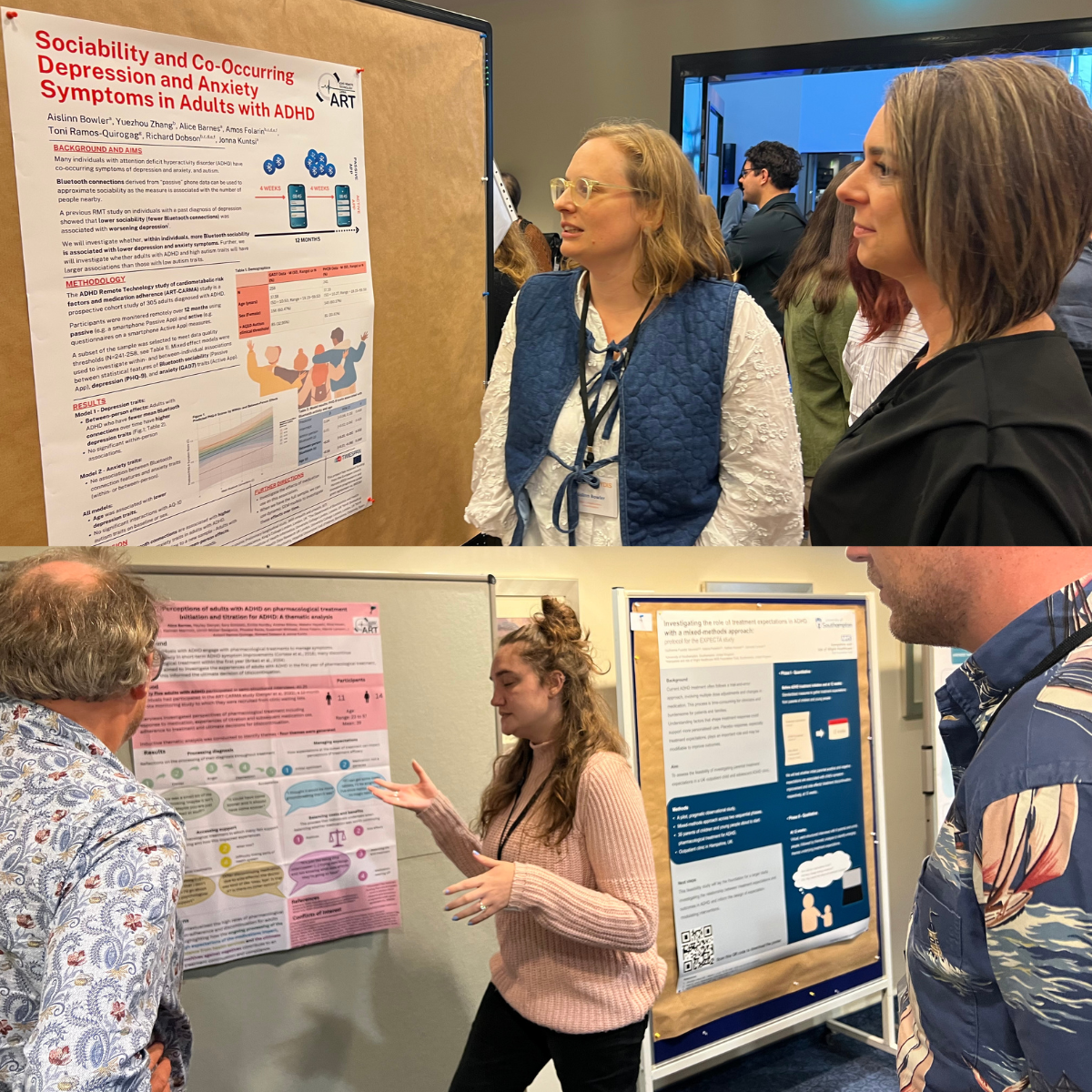
-
1 September 2025
Stephen Faraone on ADHD: Insights from Die Zeit Interview
TIMESPAN project partner Stephen Faraone (Upstate Medical University) was recently interviewed by the German weekly newspaper Die Zeit about his research on ADHD (link to original article, paywalled).
Here, we share some key takeaways:ADHD is not something that simply “disappears” in adulthood. While some children see their symptoms fade, most continue to face challenges as adults. Faraone stresses that ADHD is strongly genetic in origin (around 80% heritability) and linked to many different genes, making it a complex, brain-based condition rather than something caused by parenting or lifestyle. Environmental stressors can make symptoms worse, but they are not the root cause.
On treatment, the evidence is clear:
“Medications work very well – they improve all core symptoms, including inattention, hyperactivity and impulsivity.”
This is supported by decades of research.The scientific community also speaks with one voice.
“A few years ago, we published an international consensus statement with 80 co-authors. The scientific community agrees on the key points outlined there.”
Beyond medication, behavioral therapies and family-based interventions can help, though no alternative treatment has yet shown effects as strong or consistent as medication.
-
26 June 2025
Survey: How do you find information about ADHD?
More Details...Please help us by taking part in a very short, anonymous survey (just 2 minutes) about how people with lived experiences of ADHD and their families find and use information. Your input will help the TIMESPAN research project improve how ADHD-related resources are shared and developed.
👉 Survey
Thank you for supporting this important effort to make ADHD information more accessible and relevant!
-
11 April 2025
TIMESPAN Event: Invitation
🔸 TIMESPAN cordially invites you to a unique event exploring ADHD and co-occurring health conditions 🔸
Join us for “New Vantage Points in ADHD, Obesity, and Cardiometabolic Health: Where Research Meets Patients”, a forum bringing together lived experiences and research in ADHD in London on April 11, 2025! 🧠🧡
🎤 What to expect?
✔ Stories and conversations about ADHD & co-occurring conditions like obesity & type 2 diabetes
✔ Interactive discussions on current research and everyday challenges
✔ A unique chance to connect, share, and glimpse into the future of ADHD careUpdate: We’re delighted to share our preliminary programme! Download it here or visit our event subpage.
💡 This free event is open to all, but spots are limited!
Register now: https://docs.google.com/forms/d/e/1FAIpQLSfC5_s9CtoAWTLiIHhXIvLdwGOq2xlMm_N7XN0AlRJg11uzdw/viewform?usp=header
We’re honoured to be supported by ADDISS, the UK’s national ADHD charity, and ADHD-Europe, whose purpose is to advance the rights of, and advocate on every level throughout Europe for, people affected by ADHD and co-morbid conditions.
Also check out our fantastic location:
The Abbey Centre is a vibrant Westminster community and conference centre supporting local communities to improve their quality of life. -
11 April 2025
Save the Date: Join Us for an Inspiring Patient and Layperson Event!
We’re excited to announce TIMESPAN’s upcoming event:
“New Vantage Points in ADHD, Obesity, and Cardiometabolic Health: Where Research Meets Patients.”📅 Date: 11th April 2025
📍 Location: London, UKDon’t miss this opportunity to connect, learn, and engage with experts and individuals from the ADHD and cardiometabolic health communities. Save the date and stay tuned for more details!
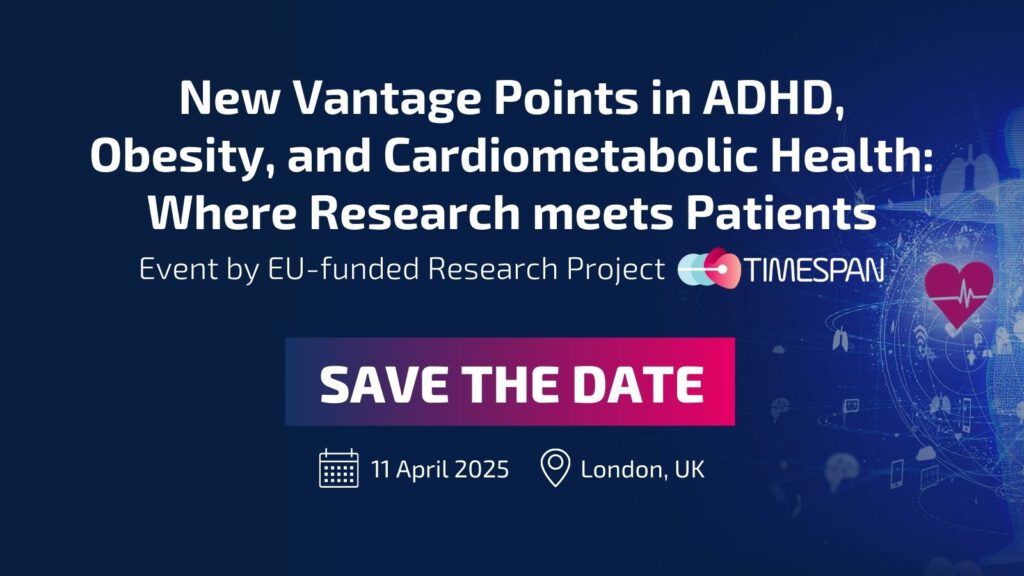
-
24 March 2025
Panel: Why do people discontinue ADHD treatment?
Many individuals with ADHD start medication but stop taking it over time. Why does this happen, and what can be done to support better treatment decisions?
TIMESPAN is proud to discuss the question “Why do people discontinue ADHD treatment?” at our Public Engagement Event on 11 April 2025 at the Abbey Centre in London.
Chaired by Jonna Kuntsi, this panel – featuring Ian Wong, Ulrich Muller-Sedgwick, Isabell Brikell, Viljo Wilding – brings together personal experiences, research insights, and clinical perspectives to explore ADHD treatment discontinuation.You can still register here: https://docs.google.com/forms/d/e/1FAIpQLSfC5_s9CtoAWTLiIHhXIvLdwGOq2xlMm_N7XN0AlRJg11uzdw/viewform?usp=header
Learn more on the event on our dedicated subpage: https://timespan.eu/patient-event/
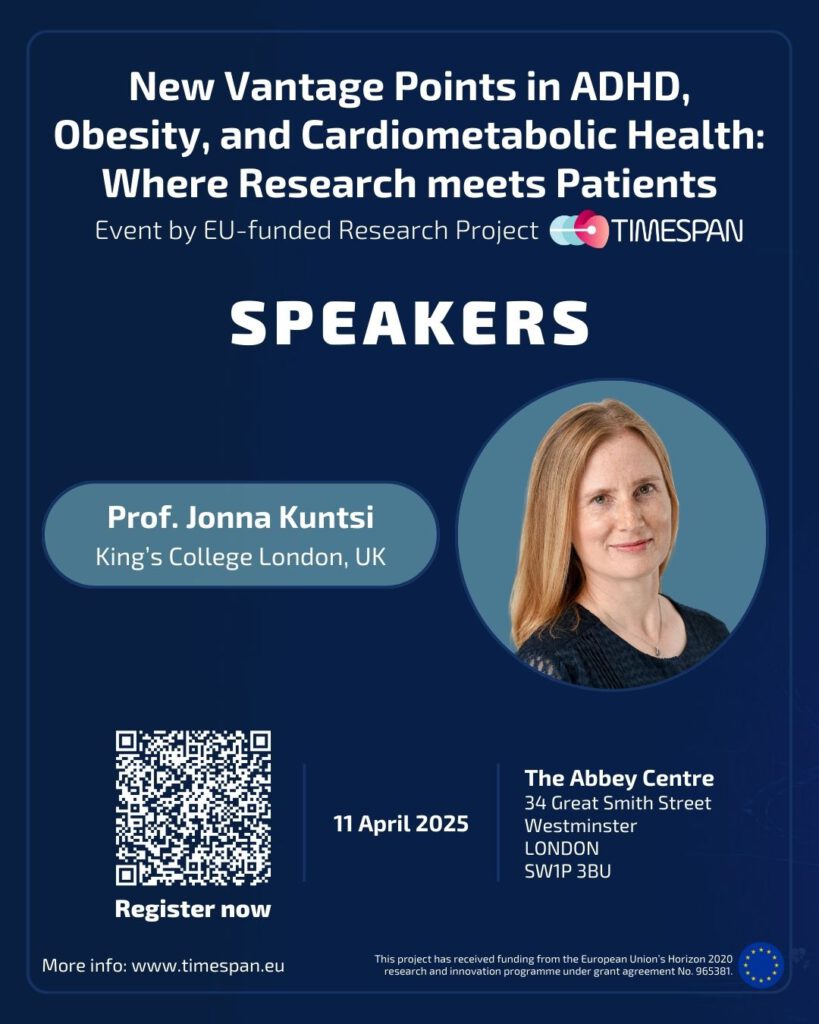
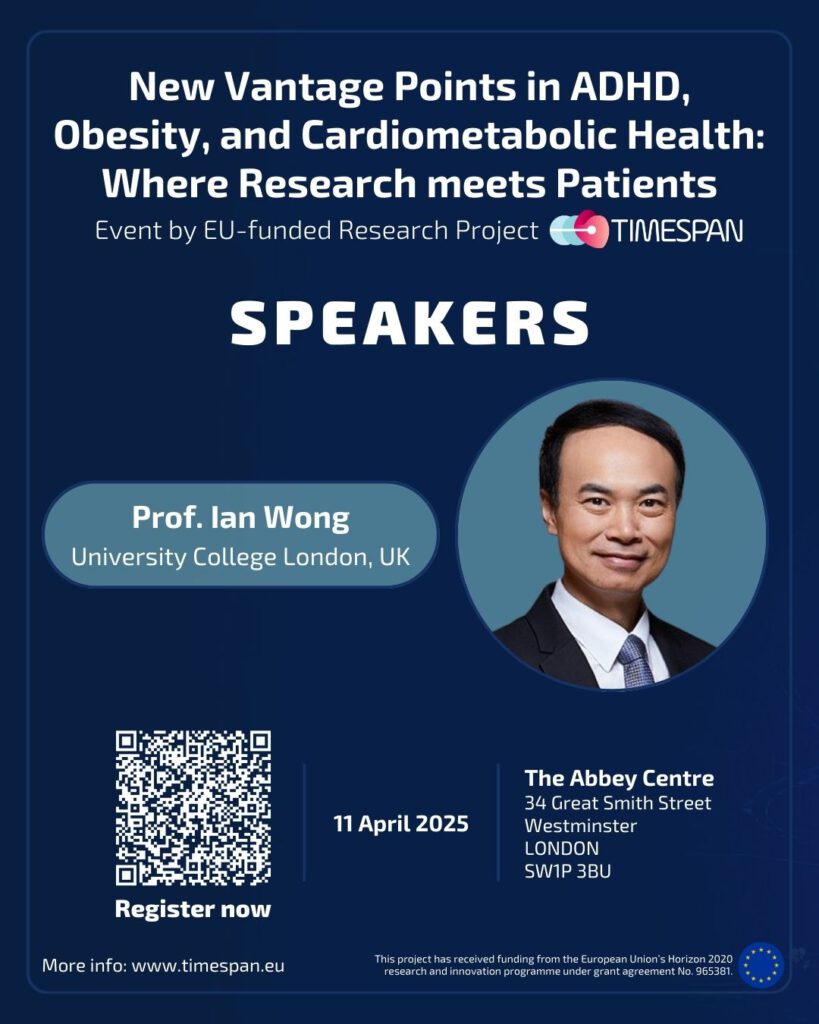
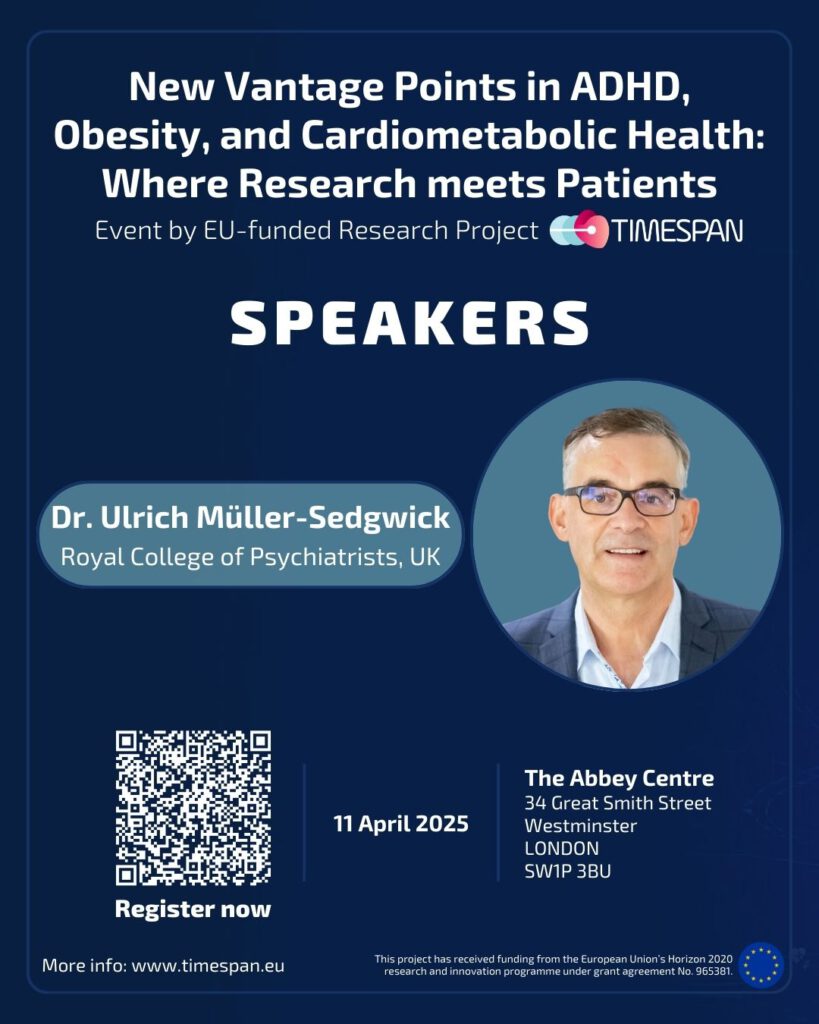
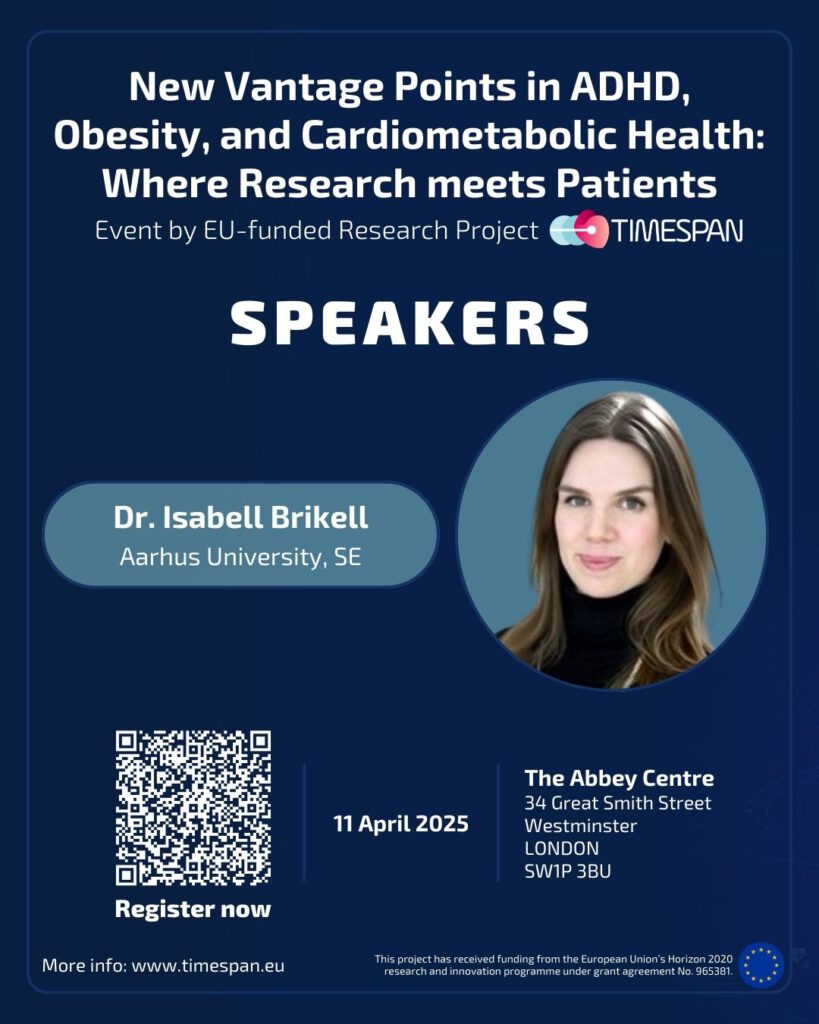
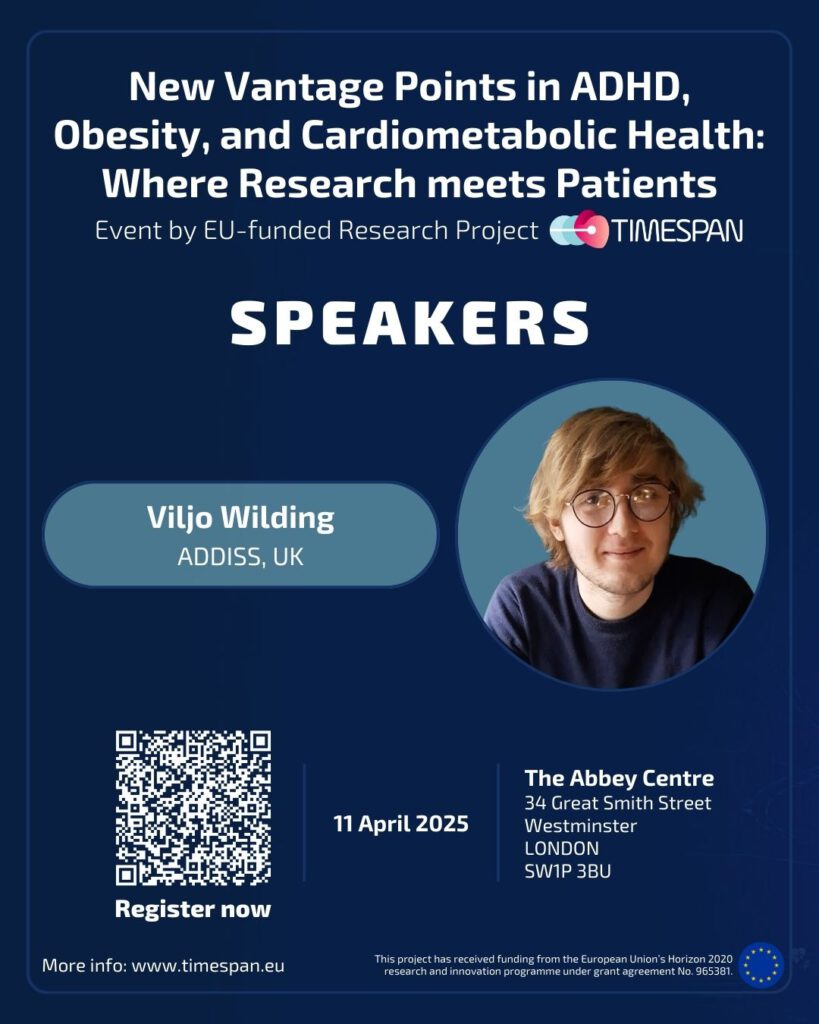
-
18 March 2025
🎥 New TIMESPAN Masterclass: Understanding Cardiovascular Risks in ADHD Using Registers
How does ADHD medication affect cardiovascular health? What can real-world data teach us about long-term risks? In our latest TIMESPAN Masterclass, Prof. Dr. @Henrik Larsson and Dr. @Zheng Chang break down the latest research on this crucial topic.
What’s covered?
✅ How randomized controlled trials (RCTs) and real-world studies compare in assessing medication risks
✅ Insights into the short- and long-term cardiovascular risks of ADHD medications
✅ The role of pharmacoepidemiology in understanding medication safety
✅ Key study designs, including within-individual comparisons, case-control studies, and target trial emulation
✅ Clinical implications for ADHD treatment and cardiovascular health📺 Watch the masterclass in our masterclass section.
-
16 January 2025
ART-CARMA Achieves Recruitment Milestone!
We are thrilled to announce the successful completion of recruitment for The ADHD Remote Technology study of cardiometabolic risk factors and medication adherence (ART-CARMA) Project!
By the end of 2024, ART-CARMA had recruited 154 participants from our King’s College London site, and a further 151 from our Barcelona partner site, the Vall d’Hebron Institute of Research (VHIR) – Vall d’Hebron Institut de Recerca, surpassing our recruitment target of 300 participants. This milestone marks a significant step forward in our journey to better understand ADHD treatment and its impact on cardiometabolic health.
With recruitment complete, all participants have entered the data collection phase. This involves a 12-month monitoring period, during which data is collected from an initial period of pre-treatment through treatment initiation and titration, and onwards.
To capture unobtrusive, real-time data during this period, ART-CARMA utilises innovative passive and active remote monitoring measures.
Participants wear the EmbracePlus wearable device which collects continuous physiological data including:
- Heart rate and variability
- Sleep patterns and activity levels
- Stress markers (electrodermal activity)
- Peripheral temperature
- Oxygen saturation (SpO2)
- Physical activity
The EmbracePlus wearable device is used alongside the RADAR-base smartphone apps during the remote monitoring period:
- Passive App: collects data to measure phone usage, sociability, relative location and background noise and light.
- Active App: Administers questionnaires at different intervals. Participants report daily on medication use, weekly on side effects, and monthly on ADHD symptoms, potential co-occurring symptoms such as anxiety and depression, and lifestyle factors such as diet, alcohol consumption, and smoking.
Cognitive tasks are also administered to participants at three key time points throughout the study: at the beginning of the participants’ study period, six months in, and at the end of the study period. These tasks are designed to assess participants’ attention and response inhibition.
What’s Next?
Our team is preparing to enter the data analysis phase, aiming to explore factors influencing medication adherence and the impact of ADHD medication and physical activity on cardiometabolic risks in adults with ADHD.
We hope that our findings will provide valuable insight to inform clinical guidelines and improve the management of ADHD and cardiometabolic risks.
A huge thank you to our amazing study participants, research teams at KCL and VHIR, ADHD clinics, Empatica and ADDIS for making this milestone possible.
Stay tuned and visit KCL’s ADHD Remote Technology (ART) LinkedIn and Bluesky for exciting updates!
-
20 December 2024
WP4 paper finally submitted!
Finally submitted! 🎉 We are excited to soon share our research on how genetics contribute to medication discontinuation in ADHD.
Stimulant medications are the first-line treatment for ADHD, but over 50% of individuals discontinue them within two years. Our study, involving 18,362 individuals from the iPSYCH cohort, aimed to uncover the genetic factors behind this.
Key findings:
- No genome-wide significant loci were identified.
- Potential genetic differences in discontinuation between children and adults.
- Higher polygenic risk scores (PRS) for psychiatric disorders linked to increased discontinuation.
- Adults showed a higher SNP-heritability for discontinuation compared to children.
- Rare deleterious variants in dopamine-related genes were less common in those who discontinued medication, especially in adults.
Our results suggest that genetics may play a slightly stronger role in medication discontinuation in adults compared to children. Stay tuned for more insights and check out the abstract here: https://www.sciencedirect.com/science/article/abs/pii/S0924977X24003390

This post was provided by Isabell Brikell.
-
19 November 2024
8th TIMESPAN Steering Committee Meeting
🌟 A day of productive collaboration for TIMESPAN!
Today’s Steering Committee (SC) meeting brought our team together to review progress, share insights, and chart the next steps in advancing research on ADHD and co-occurring cardiometabolic diseases.Collaboration like this is what helps us move closer to meaningful, patient-centered outcomes. Stay tuned for exciting updates in the months ahead!
-
14 November 2024
World Diabetes Day 2024
🌍 It’s #WorldDiabetesDay. Did you know that TIMESPAN research explores the link between maternal diabetes and childhood ADHD risk? Unlike previous studies showing a higher risk, our study of 3.6 million mother–child pairs across seven countries found only a small-to-moderate association between maternal diabetes and ADHD in offspring.
This underscores the importance of investigating genetic and environmental factors. 🌐Read more in our latest article in Nature Medicine: “Maternal diabetes and risk of ADHD in offspring”
🔗 https://www.nature.com/articles/s41591-024-02917-8 -
10 October 2024
World Mental Health Day 2024
People with Attention-Deficit/Hyperactivity Disorder (ADHD) often face mental health challenges that can greatly affect their overall well-being. Here’s what research shows:
🧠 Adults with ADHD tend to have worse mental health than those without ADHD.
🧠 50% of adults with ADHD report severe symptoms of depression, anxiety, and stress (Ogrodnik et al., 2023).
🧠 Only 42% of adults with ADHD achieve full mental well-being, compared to 73.8% of people without ADHD (Fuller-Thomson et al., 2022).
These findings highlight the importance of timely diagnosis and personalized treatment for individuals with ADHD, as addressing their unique mental health needs is crucial for improving their overall quality of life.Watch our informational video here: https://youtube.com/shorts/2US4pLcQDeU
-
1 October 2024
October is ADHD Awareness Month!
It’s ADHD Awareness Month 2024! Our goal is to enhance the clinical management of chronic cardiometabolic conditions, such as obesity and type 2 diabetes, in adults with ADHD. 🧠
More info:
🌐 TIMESPAN: https://timespan.eu/
🌐 ADHD Awareness Month: adhdawarenessmonth.org
Make sure to also check out the program organized by ADHD-Europe centered around this year’s theme “Awareness is Key”:
1st Oct, 12.30pm CET – Live with Q&A
Better Lives Together with a Positive Attitude21st Oct, 12pm CET – Live with Q&A
The HyperActive Dreamers – Education that’s Fits ALL24 Oct, 7pm CET – Panel Webinar
ADHD Women Experts + Professional Healthcare ADHD Group Members -
25 September 2024
New publication: Cumulative ADHD medication use and risk of type 2 diabetes
We are excited to announce the publication of TIMESPAN’s latest study in BMJ Mental Health, examining the relationship between cumulative ADHD medication use and the risk of type 2 diabetes (T2D) in adults. This study is one of the largest of its kind, analyzing over 138,000 individuals with ADHD in Sweden, tracked between 2007 and 2020.
Key Findings:
The research found that overall, ADHD medications do not increase the risk of developing type 2 diabetes, which is an important finding for individuals managing ADHD. However, there are some important nuances in the results:
- Methylphenidate, the most common ADHD medication, was not associated with an increased risk of type 2 diabetes.
- Lisdexamfetamine showed no significant association with type 2 diabetes.
- However, long-term use of atomoxetine (more than 3 years) was linked to a slightly higher risk of developing type 2 diabetes (44% increased risk).
Implications for Clinical Practice:
These findings suggest that clinicians should be aware of the potential metabolic risks, especially with long-term use of atomoxetine. Regular monitoring and patient-specific strategies will help manage both ADHD symptoms and potential cardiometabolic risks. The study calls for further research to confirm these results and explore mechanisms behind this association.
For more information, please refer to the full article in BMJ Mental Health: https://mentalhealth.bmj.com/content/27/1/e301195
-
28 August 2024
TIMESPAN at #ECNP2024
We’re excited to share that TIMESPAN members will be present at prestigious ECNP Congress 2024 in Milan, Italy.
Held from 21st to 24th September 2024, the congress promises to be the largest meeting in applied and translational neuroscience.Join our TIMESPAN symposium “Treatment of ADHD across the lifespan: monitoring and predicting outcome” on Tuesday, 24th September, from 08:30 to 09:50 am in Gold Plenary.
- Chair: Zheng Chang, Sweden (Karolinska Institutet)
- Isabell Brikell, Sweden (Karolinska Institutet and Aarhus University): Patterns and predictors for ADHD treatment use and discontinuation across the lifespan: a multi-national investigation
- Catharina A. Hartman, Netherlands (University of Groningen): Somatic comorbidity in individuals with ADHD, including links with medication
- Hayley Denyer, United Kingdom (King’s College London): Using remote measurement technology to identify real-world consequences of ADHD medication treatment initiation in adults with ADHD
- Ditte Demontis, Denmark (Aarhus University): Genetic architecture of childhood maltreatment and suicide attempt in ADHD and other psychiatric disorders
-
22 July 2024
World Brain Day 2024
TIMESPAN celebrates World Brain Day. #WBD2024 is dedicated to Brain Health and Prevention
We aim to improve the clinical management of chronic cardiometabolic diseases, such as obesity or type 2 diabetes in adult patients with ADHD.
Also, we explore patterns in their treatment behaviour – Do people with ADHD take their meds regularly? If not, why? And what could be improved?
-
24 June 2024
TIMESPAN Podcast: Observations from Finnish ADHD Association, with Nina Hovén (ep 2)
Welcome to the TIMESPAN Podcast! A format that gives a stage to different perspectives of people with ADHD.
In our second episode we join Nina Hovén as she shares insights about how ADHD is managed in her home country Finland and what ADHD Associations need to do in the future!Nina Hovén is Executive Director at ADHD Liitto ry, the Finnish ADHD Organisation, which was founded in 1989.
Nina joined ADHD Liitto ry in 2012 and since 2023, she was elected as president of ADHD Europe until end of term 2026. -
17 June 2024
Postdoctoral Position in Prof. Steve Faraone’s Lab
We are seeking a highly motivated and talented Postdoctoral Researcher to conduct predictive modeling analyses using machine learning and deep learning. This position could either be on-site or remote. The postdoctoral associate will work with a multidisciplinary team to develop novel algorithms for predicting mental disorder diagnosis and prognosis, assessing the effects of treatments, facilitating a better understanding of the comorbidity and clinical outcomes of ADHD and related disorder.
Applicants must have a PhD in Neuroscience, Psychology, Computer Science/Vision, Data Sciences, or a related field.
Experience and Preferred Skills:
- Works independently on research projects designed by a mentor.
- Experience in neuroscience, psychology, or psychiatric research.
- Experience in machine learning and statistical analysis.
- Programming skills and/or statistical skills (Python, R, or STATA/SAS/SPSS).
- Experience with deep-learning software (Pytorch and TensorFlow).
- Proficient level of comfort and expertise in handling large data.
- Exceptional candidates with a demonstrated track record and experience in data science, machine learning, and/or psychiatric research.
Applicants should send their CV and a one page description of their background and future goals to Ms Pat Forken: forkenp@upstate.edu
-
12 June 2024
Diabetes Awareness Week #2
It’s #DiabetesWeek! We would like to raise awareness, backed by science and highlight scientific articles from TIMESPAN members. Read our first post here.
A recent study in renowned journal Diabetes Research and Clinical Practice examined the effects of ADHD and ADHD treatment on glycemic management in type 1 diabetes.Conducting a systematic review and meta-analysis of observational studies, researchers found that mean HbA1c levels were significantly higher in T1D individuals with ADHD compared to those without ADHD. The rates of suboptimal HbA1c levels, hospitalization, diabetic ketoacidosis, and hypoglycemia were all substantially higher in T1D individuals with ADHD than those without ADHD. No difference was found in mean HbA1c between those who received ADHD treatment and those who did not.
The authors concluded that identifying and addressing ADHD symptoms in T1D can improve glycemic management, and help prevent acute diabetes-related complications.
Read the full publication here: https://www.diabetesresearchclinicalpractice.com/article/S0168-8227(24)00049-4/
-
10 June 2024
Diabetes Awareness Week #1
It’s #DiabetesWeek! A recent study in nature medicine examined the link between maternal diabetes mellitus and ADHD.
Analyzing 3.6 million mother-child pairs, researchers found a small-to-moderate risk of ADHD in children exposed to maternal diabetes mellitus. The association between gestational diabetes mellitus and ADHD is unlikely to be causal.
This finding contrast with previous studies, which reported substantially higher risk estimates, and underscores the need to reevaluate the precise roles of hyperglycemia and genetic factors in the relationship between MDM and ADHD.The study is open access via: https://doi.org/10.1038/s41591-024-02917-8
-
14 May 2024
Paper awarded Publication of the Year!
🏆 CONGRATS! Isabell Brikell has been awarded the “Publication of the Year” prize by the Department of Global Public Health and Primary Care (IGS), University of Bergen (UiB). We’d like to extend this congratulations to Lin Li and Honghui Yao, who contributed equally to the paper.
The winning publication is titled “ADHD medication discontinuation and persistence across the lifespan: a retrospective observational study using population-based databases.”
Read the paper here.
Special congrats also to Kari Klungsøyr and Zheng Chang, as well as to all authors. As always, science is a group effort!

-
16 April 2024
TIMESPAN’s 4th General Assembly Meeting
🌟 Reflecting on an important event for TIMESPAN! 🧠
Last week, we convened for our fourth General Assembly Meeting in Copenhagen, Denmark, where we engaged in in-depth discussions covering our different work packages.
A highlight ✨ was our posterwalk, where TIMESPAN’s Early Career Researchers presented their work and received valuable feedback.
It was an inspiring meeting filled with insightful discussions and strategic planning for the future of our project.
The dedication and collaboration of our international team continues to drive our project forward.
A huge thank you to everyone who participated and contributed to making this meeting a success! Onward and upward! 💪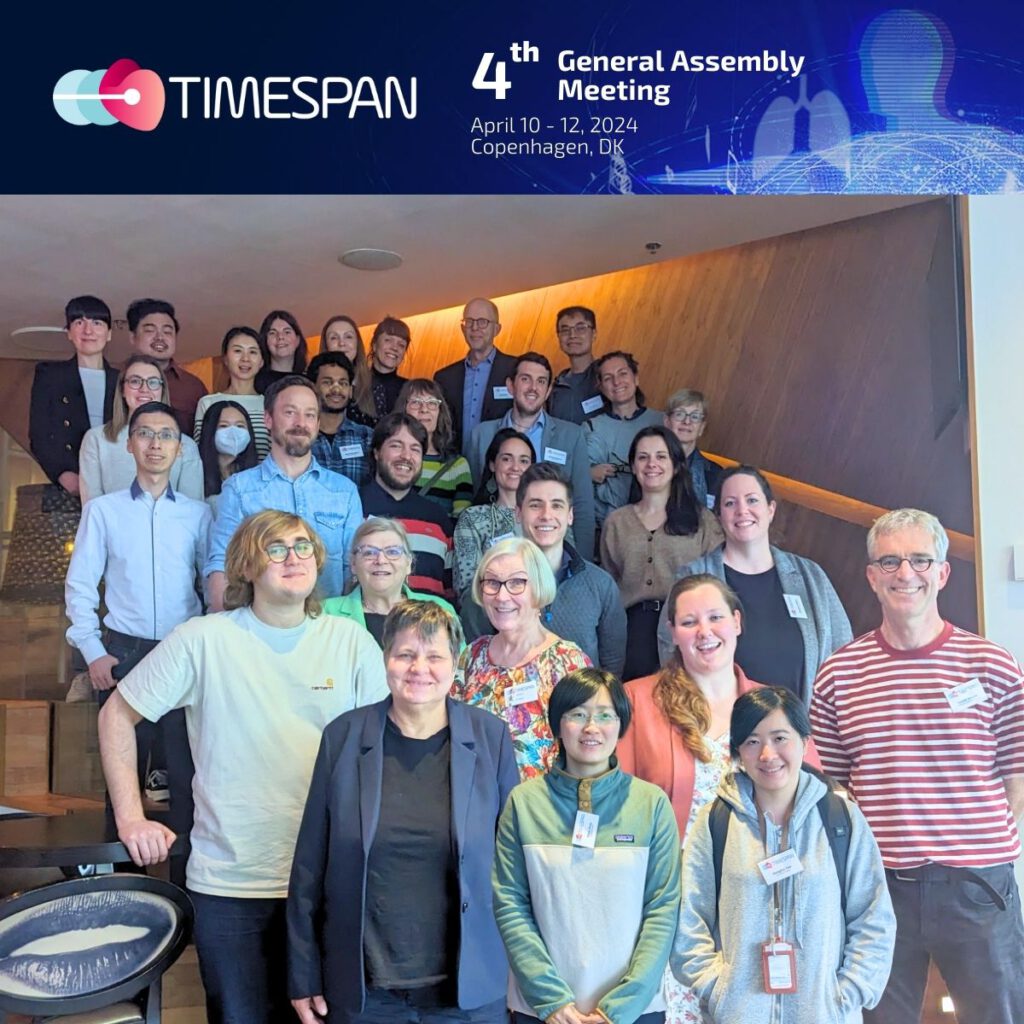
-
8 April 2024
Article in nature medicine: Maternal diabetes and risk ofattention-deficit/hyperactivity disorderin offspring in a multinational cohortof 3.6 million mother–child pairs
Many TIMESPAN members have contributed to this multinational cohort study with linked mother–child pairs data in Hong Kong, New Zealand, Taiwan, Finland, Iceland, Norway and Sweden to evaluate associations between maternal diabetes mellitus (MDM) and ADHD. The team studied over 3.6 million mother-child pairs and showed that children who were born to mothers with any type of diabetes during pregnancy had a higher risk of ADHD than unexposed children (pooled hazard ratio (HR) = 1.16, 95% confidence interval (CI) = 1.08-1.24).
However, siblings with discordant exposure to GDM in pregnancy had similar risks of ADHD (pooled HR = 1.05, 95% CI = 0.94-1.17), suggesting potential confounding by unmeasured, shared familial factors.
The findings indicate that there is a small-to-moderate association between MDM and ADHD.Read the full paper here: https://doi.org/10.1038/s41591-024-02917-8
-
4 April 2024
Upcoming: TIMESPAN’s 4th GA Meeting
Packed your suitcases and prepared all slides, yet? It’s less than a week until the TIMESPAN consortium meets again in-person, and for our colleagues who can’t make it to beautiful Copenhagen, there will be a hybrid option. During our 4th General Assembly Meeting, we’ll be discussing the project’s progress, its achievements so far, and plan ahead for the year to come.
-
3 April 2024
ART-CARMA enrolled the 200th patient
The ART-CARMA team have now enrolled 200 participants into the study! A huge thank you to the data collection teams in both London and Barcelona and to all of our participants!
Follow KCL’s ADHD RemoteTech team and TIMESPAN on X (formerly Twitter)!
-
2 April 2024
New paper: Associations between ADHD genetic liability and ICD-10 medical conditions in adults.
In a Phenome-Wide Association Study (PheWAS), using data from the Estonian Biobank and genetic risk scores related to ADHD, this study found strong links with chronic obstructive pulmonary disease (COPD), obesity, and Type-2 diabetes.
The article, titled “Associations between attention-deficit hyperactivity disorder genetic liability and ICD-10 medical conditions in adults: utilizing electronic health records in a Phenome-Wide Association Study” is authored by Ellis Haan, Kristi Krebs, Urmo Võsa, Isabell Brikell, Henrik Larsson, Kelli Lehto and the Estonian Biobank Research Team.
-
12 March 2024
New paper: ADHD-medication linked to reduced mortality
A recent study published in JAMA by Lin Li et al. titled “ADHD Pharmacotherapy and Mortality in Individuals With ADHD” researchers also from TIMESPAN reveals a correlation between ADHD medication usage and a decreased likelihood of premature death. The findings suggest that the risk of death from unnatural causes, such as accidents and overdoses, may be reduced by 25% with ADHD medication.
The study showed that there is a link between initiation of medication and a lower risk of death. “This was true regardless of the cause of death, but the risk of dying from unnatural causes, such as alcohol and drug overdose, decreased the most. The association was not as strong for the risk of dying from natural causes as physical health conditions,” says Lin Li, postdoctoral researcher at the Department of Medical Epidemiology and Biostatistics at Karolinska Institutet and first author of the study.
-
22 February 2024
New paper in Nature Reviews Disease Primers: Attention-deficit/hyperactivity disorder
In this comprehensive Nature review by Stephen V. Faraone, Mark A. Bellgrove, Isabell Brikell, et al., three authors—Stephen Faraone, Isabell Brikell and Catharina A. Hartman—were supported by TIMESPAN. Congrats team!
Key facts:
- Attention-deficit/hyperactivity disorder is a common neurodevelopmental condition that affects children and adults worldwide.
- ADHD has a predominantly genetic aetiology that involves common and rare genetic variants.
- Some environmental correlates of the disorder have been discovered but causation has been difficult to establish.
- The heterogeneity of the condition is evident in the diverse presentation of symptoms and levels of impairment, the numerous co-occurring mental and physical conditions, the various domains of neurocognitive impairment, and extensive minor structural and functional brain differences.
- The diagnosis of ADHD is reliable and valid when evaluated with standard diagnostic criteria.
- Curative treatments for ADHD do not exist but evidence-based treatments substantially reduce symptoms and/or functional impairment.
- Medications are effective for core symptoms and are usually well tolerated.
- Some non-pharmacological treatments are valuable, especially for improving adaptive functioning.
- Clinical and neurobiological research is ongoing and could lead to the creation of personalized diagnostic and therapeutic approaches for this disorder.
Read the full publication here.
-
30 January 2024
Keynote lecture #2: The Impact of Microbiota on Host Diseases and Drugs Using Estonian Microbiome Cohort Data by Prof. Elin Org
What is the microbiome? How does it affect human health and mental health?
New keynote now live!
Learn about the Gut-Brain Connection and the association between microbiome and diseases.
We invited Dr. Elin Org, associate professor at the University of Tartu as keynote speaker to talk about The Impact of Microbiota on Host Diseases and Drugs Using Estonian Microbiome Cohort Data.
-
10 December 2023
How can we improve the management of individuals with attention deficit hyperactivity disorders and co-occurring cardiometabolic disease?
Read in, as Prof. Dr. Henrik Larsson, coordinator of the TIMESPAN project, discusses the questions
- Why improve the management of cardiometabolic disease in ADHD?
- Which knowledgegaps need to be addressed?
Click here to read the full review article.
-
30 November 2023
Masterclass #3: ADHD Biomarkers by Prof. Dr. Jan Buitelaar
Prof. Dr. Jan Buitelaar, professor of child and adolescent psychiatry at Radboud University Medical Center, provides a thorough overview of current research on ADHD biomarkers in this masterclass. He delves into several reviews and meta-analytical papers on different types of biomarkers, and highlights the principles and validation processes of biomarkers in general. The session is enriched with insightful examples from biomarker research, offering a deep and engaging exploration of this intricate field.
Watch the masterclass in our masterclass section or directly on YouTube.
-
27 November 2023
New paper on psychiatric comorbidities in women with and without ADHD in Iceland
A cross-sectional analysis of the nationwide, all-female, population-based SAGA Cohort Study has been published in BMC Medicine. Congratulations to the team!
Conclusion: ADHD is overrepresented among women with cardiometabolic conditions and contributes to other psychiatric comorbidities.
Click here to read full article.
-
27 November 2023
First multinational study from TIMESPAN published
“Early medication discontinuation is common in ADHD across countries, which can represent a major barrier to positive treatment outcomes.”
The first multinational study published in Lancet Psychiatry reveals key insights into ADHD medication discontinuation covering 9 countries and regions. Our research shows early discontinuation is common, particularly in young adults. Read full article here.
Congratulations to the team!
-
22 November 2023
New paper from our TIMESPAN colleagues using Swedish register data
Is long-term use of attention-deficit/hyperactivity disorder (ADHD) medication associated with an increased risk of cardiovascular disease (CVD)?
This nationwide study found long-term exposure to ADHD medication was associated with increased risk of cardiovascular disease; therefore, the potential risks and benefits of long-term ADHD medication use should be carefully weighed.
Click here to read full article.
-
10 November 2023
ART-CARMA study reaches two big milestones
In November, we reached two big milestones in WP5 – the first ART-CARMA study participant has finished their 12-month remote-monitoring period and we are halfway through the recruitment now (150 participants enrolled). Thank you to all of our participants for your valuable input and to the data collection teams in London and Barcelona!
-
2 November 2023
TIMESPAN at ODISSEI conference 2023
Last week, Catharina Hartman of Partner UMCG presented during the ODISSEI conference: “The association between Attention Deficit Hyperactivity Disorder and treatment discontinuation for Type 2 Diabetes Mellitus: research based on a nationwide population-based cohort study in the Netherlands”
Yiran Li, also of UMCG, presented her poster with the title “Cardiometabolic diseases of people with Autism Spectrum Disorder: a nationwide population-based cohort study in the Netherlands”.
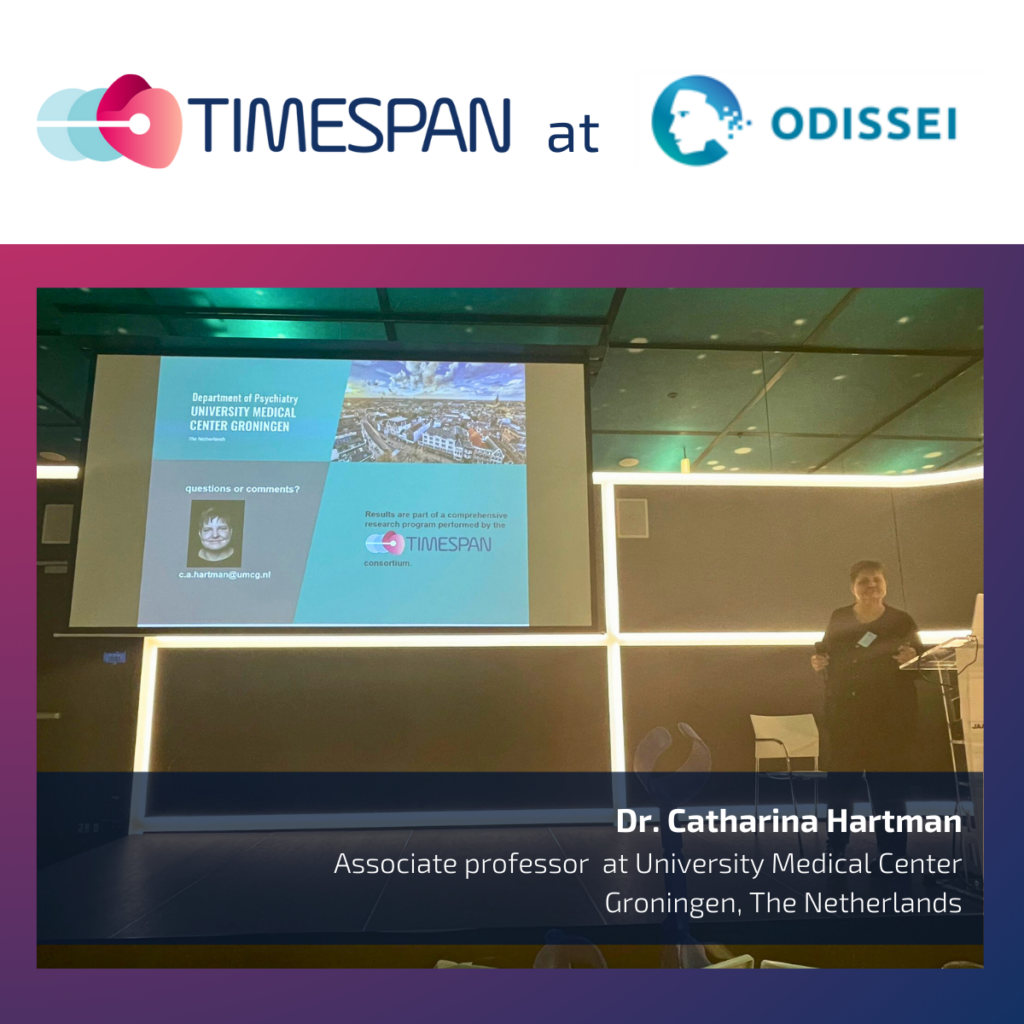
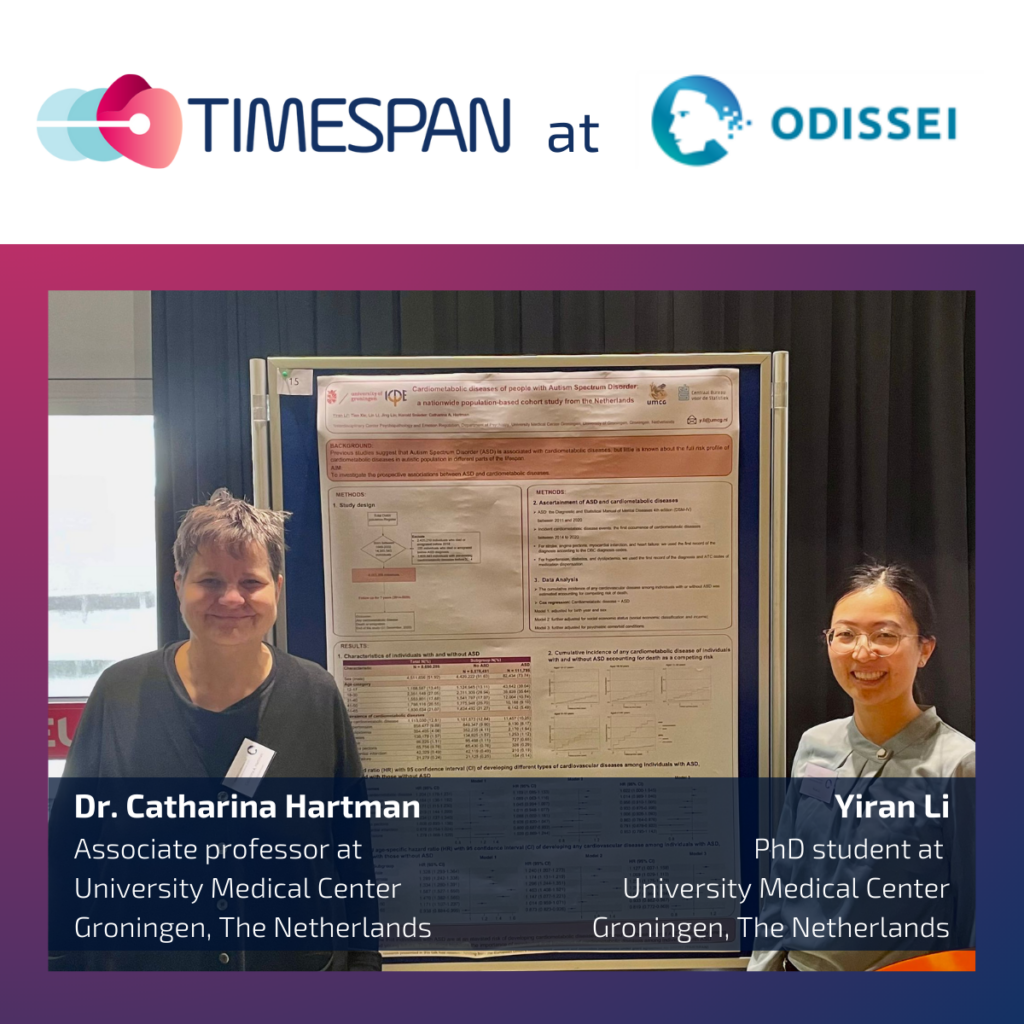
-
24 October 2023
TIMESPAN Podcast: Perspectives of people with ADHD. Andrea Bilbow, OBE (ep 1)
Welcome to the TIMESPAN Podcast! A format that gives a stage to different perspectives of people with ADHD. In the very first episode, Andrea Bilbow (OBE), shares her personal ADHD journey. Andrea Bilbow is founder and CEO at ADDISS the UK National Attention Deficit Disorder Information and Support Service, which she founded in 1995.
Citing her own words, Andrea is the poster girl for TIMESPAN, as our main objective is to advance the management of adult attention deficit hyperactivity disorder and co-occurring cardiometabolic disease. Emerging evidence points at substantial comorbidity and shared genetics between adult ADHD and cardiometabolic diseases i.e., Obesity, Type 2 Diabetes and cardiovascular disease (CVD). However, screening, diagnosis and treatment guidelines for ADHD patients with these diseases do not exist. TIMESPAN builds on real-world data from daily clinical practice, but will also collect new detailed data through Remote Measurement Technology (RMT) to allow for improved identification of ADHD patients at risk for cardiometabolic outcomes and improved multidisciplinary and personalized treatment approaches. TIMESPAN is an EU-funded research project led by international recognised leaders working together on an interdisciplinary basis, consisting of clinicians, epidemiologists, biostatisticians, geneticists and artificial intelligence computer scientists.
-
27 September 2023
TIMESPAN members receive Kramer-Pollnow Prize!
Last week, our TIMESPAN members Kenneth Man (from UCL in London) and Zheng Chang (from Karolinska Institutet in Stockholm) were awarded the Kramer-Pollnow Prize for scientific excellence in the research on ADHD!
Congratulations!
The prize was presented at this year’s EUNETHYDIS members meeting in Montpellier, France.
The Kramer-Pollnow Prize is awarded every two years for scientific excellence in research in child and adolescent psychiatry.
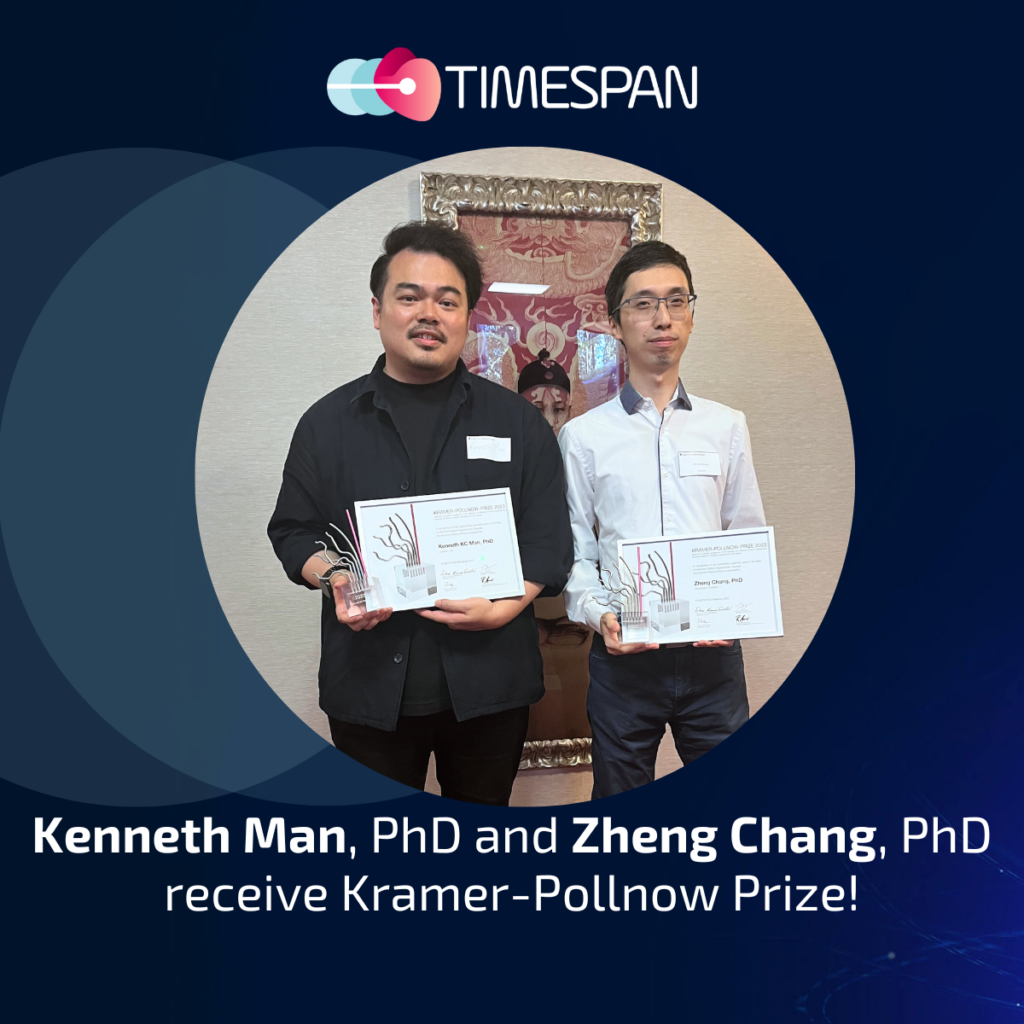
Kramer-Pollnow Prize awardees Kenneth Man, PhD from UCL, Zheng Chang, PhD, from KI
Photo ©EUNETHYDIS -
6 September 2023
Keynote lecture #1: Epidemiological conditions of cardiovascular diseases by Pontus Andell, MD, PhD
Pontus Andell, MD, PhD, associate professor at Karolinska Institutet and resident cardiologist at Karolinska University Hospital in Stockholm, Sweden, held the very first keynote lecture titled “Epidemiological conditions of cardiovascular diseases” during the General Assembly Meeting of TIMESPAN in Stockholm in May 2022.
Learn more about which cardiovascular diseases are most relevant in ADHD, the burden of cardiovascular diseases in general, and how we can use registry-based data to study CVDs in the keynote lecture.
-
2 August 2023
Masterclass #2: What can family data tell us about unmeasured confounding? by Ralf Kuja-Halkola, PhD
Ralf Kuja-Halkola, PhD, researcher and statistician at Karolinska Institutet in Stockholm, Sweden, gave a masterclass titled “What can family data tell us about unmeasured confounding?” during the General Assembly Meeting of TIMESPAN in Stockholm in May 2022.
Learn more about directed acyclic graphs and how to use them to make assumptions about associations in his masterclass.
-
22 July 2023
World Brain Day 2023
Every year, 22nd July marks World Brain Day, an awareness day launched by World Federation of Neurology. Even though the 2023 theme is “Brain Health and Disability: Leave No One Behind”, it is also important to talk about ADHD brains!
ADHD is a neurodevelopmental condition with traits and behaviours stemming from a different brain development in key stages of brain development.
Research has identified several potential disparities in the brains of individuals with ADHD compared to those without the condition. However, the precise significance of these variances remains uncertain.
https://www.additudemag.com/category/adhd-add/adhd-brain/ is a great resource for understanding the neuroscience behind ADHD.
TIMESPAN aims to improve not only the assessment of the risks involved for patients, but also to review and improve already existing treatments for patients with ADHD who also have cardiometabolic disease.
-
12 May 2023
Meet TIMESPAN members at 9th World Congress on ADHD
We’re excited to share that members of our consortium will present at the 9th World Congress on ADHD from 18 – 21 May, 2023 in Amsterdam, NL.
18.05.2023:
3:00 – 4:30 pm CET, room G107
Dr. Zheng Chang from Karolinska, Sweden, and Prof. Ditte Demontis from Aarhus Uni, Denmark will chair the Hot topic “Advancing the understanding of ADHD treatment discontinuity using real-world data”
Sessions include:
- ADHD treatment discontinuation across the lifespan: A multi-national study (by Zheng Chang)
- Adherence of ADHD medication and pharmacological treatment for cardiovascular disease (by Zheng Chang)
- Remote measurement technology data on real-world treatment response to ADHD medication in adults with ADHD following initiation of medication (by Hayley Denyer, Kings College London)
- Genetic loci and polygenic architecture of simulant ADHD medication discontinuation (by Prof. Ditte Demontis)
3:00 – 4:30 pm CET, room G109
Dr Le Zhang, will present “ADHD medications and long-term risk of cardiovascular diseases: A nationwide nested case-control study in Sweden” at Young Scientists´ Session I.
19.05.2023:
2:00 – 3:30 pm CET, Onyx Lounge
The poster session “Comorbidity: adults” is chaired by TIMESPAN partner Prof. Josep Antoni Ramos Quiroga (from Fundacio Hospital Universitari Vall D’Hebron).
In this session, Unnur Jakobsdottir Smari, of TIMESPAN partner University of Iceland, will be presenting her poster: “Anxiety and mood disorders in women with cardiometabolic conditions with and without ADHD: A population-based cross sectional study”.
Additionally, Nina Nielsen, of our partner Aarhus University, will present her poster, titled “Association between ADHD and initiation of a lipid-lowering drug in adults: A nationwide study”.
20.05.2023:
3:30 – 5:00 pm CET, room G102-G103
Prof. Jonna Kuntsi of Kings College London will be chairing the Hot Topic Session: ‘What is new in digital psychiatry in ADHD?’ and providing a talk in this session ‘ADHD Remote Technology (ART) research programme: from current research towards future clinical application’
-
17 April 2023
Successful meeting: TIMESPAN’s third General Assembly
TIMESPAN’s 3rd General Assembly Meeting took place in Tallinn, Estonia from 12 – 14 April, 2023. The meeting started with a masterclass given by Prof. Jan Buitelaar from Radboud University Medical Center and a keynote lecture by Dr. Elin Org from the University of Tartu.
During the two main meeting days, work package leaders and members have presented and discussed their scientific data and the overall progress of their work. Thanks to invaluable discussions, the consortium is now full of beans for the months to come.
-
28 November 2022
TIMESPAN´s first ECS Journal Club
The 1st TIMESPAN ECS Journal Club, started with Hayley Denyer´s brilliant presentation about the ADHD Remote Technology (‘ART’) pilot study. Thanks to all involved for livening up the discussion and for sharing knowledge!
-
9 November 2022
Intensive and successful 4th SC-Meeting
What an intensive 4th SC-Meeting! We were delighted meeting all TIMESPAN partners again and hear about #TIMESPAN ´s big #progress on #management of #chronic#cardiometabolic disease and #treatment discontinuity in #adult#ADHD patients. Let´s keep up the amazing work!
-
24 October 2022
TIMESPAN @ EASO: Webinar on ADHD and Obesity
Don´t miss the EASOCOMs Webinar: ADHD and Obesity on 25th October 2022!
When? 12.30-14.00 CEST
TIMESPAN Prof Henrik Larsson and Prof Dr J. Antoni Ramos presenting ADHD101
• Professor Henrik Larsson will present the register-based studies from Sweden exploring causes and consequences of obesity in ADHD
• Professor Dr J. Antoni Ramos-Quiroga will present ADHD across lifespan -
19 August 2022
TIMESPAN´s Rubik´s Cube out now
More Details...… as a digital intro version for all TIMESPAN video products..🎥
-
7 May 2022
TIMESPAN webinar at ADHD Europe
TIMESPAN coordinator Prof. Henrik Larsson from the Örebro University in Sweden gives a short webinar about the TIMESPAN project at ADHD Europe.
👉Watch the whole webinar here.
-
24 February 2022
TIMESPAN Patient Brochure
In collaboration with ADHD Europe our new brochure for patients is available as web and print version with the most important facts of TIMESPAN and how the ART-CARMA research contributes to a healthier future for ADHD patients.
-
30 November 2021
2nd SC Meeting
Our 2nd SC meeting was held (once again) remote on 29 – 30 November 2021. Thank you all for your interesting updates as well as the great brainstorming sessions during the 2nd SC meeting! @orebrouni@karolinskainst@AarhusUni@UiB@researchumcg@vallhebron@KingsIoPPN@concentris_EU@EASOobesity@UpstateNews@empatica@hkumed#H2020#ADHD
-
3 October 2021
TIMESPAN at the 34th ECNP Congress
📢 TIMESPAN was represented today at ECNP by @IsabellBrikell. She talked about somatic health in ADHD, including results for several of the cardiometabolicdisorder we are looking into in TIMESPAN.
⏲️ 13:15-14:35 WEST
🏛️ Auditorium I of the #Lisbon #Congress #Venue -
24 September 2021
TIMESPAN Project Brochure
You can now access a web and a print version of the project’s info brochure with the most important facts of TIMESPAN and how the ART-CARMA research contributes to a healthier future for ADHD patients.
-
18 May 2021
KICK-OFF TIMESPAN meeting
The EU-funded research project TIMESPAN kicked off on May 18th – 19th 2021. The meeting was held remotely and although being held virtually it was full of vivid discussions as well as social interaction. 17 partners from all over the world joined forced evaluate the next steps that has to be taken in TIMESPAN. One of the main tasks was data harmonization as well as data access, definition of treatment discontinuity, and joined dissemination. All TIMESPAN scientific as well as ad hoc advisors also joined the meeting and provided a very valuable feedback on the project start.
-
1 April 2021
KICK-OFF TIMESPAN project
No April Fool’s joke, but the start of an exciting journey! Today, April 1st 2021, the 5 year-long EU-funded TIMESPAN project kicks off! 17 partners from academia, industry, and patient advocacy join forces in fostering improvements in clinical management of adults with #ADHD and co-occurring cardiometabolic disease.
Various national guidelines on cardiometabolic disease already highlight the importance of concurrent psychiatric disorders, but there is a lack of knowledge around ADHD. TIMESPAN strives to improve clinical outcomes, as well as Quality Of Life in adult ADHD patients with cardiometabolic disease.
-
World Brain Day 2025: ADHD and Brain Health Across the Lifespan
This year’s World Brain Day theme – Brain Health for All Ages – aligns strongly with our mission at TIMESPAN.
ADHD is one of the most common brain conditions of childhood and adolescence. But it doesn’t end there. Our research explores how ADHD can affect physical health later in life, including elevated risks for obesity, type 2 diabetes, and cardiovascular disease.
By using genetic data and large population-based studies, TIMESPAN investigates how the brain and body are connected – and how understanding these links can help inform earlier interventions and healthier outcomes across the lifespan.
Stay tuned! We’ll be sharing results from several major studies soon.
Events
-
11 April 2025
Save the Date: Join Us for an Inspiring Patient and Layperson Event!
We’re excited to announce TIMESPAN’s upcoming event:
“New Vantage Points in ADHD, Obesity, and Cardiometabolic Health: Where Research Meets Patients.”📅 Date: 11th April 2025
📍 Location: London, UKDon’t miss this opportunity to connect, learn, and engage with experts and individuals from the ADHD and cardiometabolic health communities. Save the date and stay tuned for more details!

-
11 April 2025
TIMESPAN Event: Invitation
🔸 TIMESPAN cordially invites you to a unique event exploring ADHD and co-occurring health conditions 🔸
Join us for “New Vantage Points in ADHD, Obesity, and Cardiometabolic Health: Where Research Meets Patients”, a forum bringing together lived experiences and research in ADHD in London on April 11, 2025! 🧠🧡
🎤 What to expect?
✔ Stories and conversations about ADHD & co-occurring conditions like obesity & type 2 diabetes
✔ Interactive discussions on current research and everyday challenges
✔ A unique chance to connect, share, and glimpse into the future of ADHD careUpdate: We’re delighted to share our preliminary programme! Download it here or visit our event subpage.
💡 This free event is open to all, but spots are limited!
Register now: https://docs.google.com/forms/d/e/1FAIpQLSfC5_s9CtoAWTLiIHhXIvLdwGOq2xlMm_N7XN0AlRJg11uzdw/viewform?usp=header
We’re honoured to be supported by ADDISS, the UK’s national ADHD charity, and ADHD-Europe, whose purpose is to advance the rights of, and advocate on every level throughout Europe for, people affected by ADHD and co-morbid conditions.
Also check out our fantastic location:
The Abbey Centre is a vibrant Westminster community and conference centre supporting local communities to improve their quality of life. -
28 August 2024
TIMESPAN at #ECNP2024
We’re excited to share that TIMESPAN members will be present at prestigious ECNP Congress 2024 in Milan, Italy.
Held from 21st to 24th September 2024, the congress promises to be the largest meeting in applied and translational neuroscience.Join our TIMESPAN symposium “Treatment of ADHD across the lifespan: monitoring and predicting outcome” on Tuesday, 24th September, from 08:30 to 09:50 am in Gold Plenary.
- Chair: Zheng Chang, Sweden (Karolinska Institutet)
- Isabell Brikell, Sweden (Karolinska Institutet and Aarhus University): Patterns and predictors for ADHD treatment use and discontinuation across the lifespan: a multi-national investigation
- Catharina A. Hartman, Netherlands (University of Groningen): Somatic comorbidity in individuals with ADHD, including links with medication
- Hayley Denyer, United Kingdom (King’s College London): Using remote measurement technology to identify real-world consequences of ADHD medication treatment initiation in adults with ADHD
- Ditte Demontis, Denmark (Aarhus University): Genetic architecture of childhood maltreatment and suicide attempt in ADHD and other psychiatric disorders
-
16 April 2024
TIMESPAN’s 4th General Assembly Meeting
🌟 Reflecting on an important event for TIMESPAN! 🧠
Last week, we convened for our fourth General Assembly Meeting in Copenhagen, Denmark, where we engaged in in-depth discussions covering our different work packages.
A highlight ✨ was our posterwalk, where TIMESPAN’s Early Career Researchers presented their work and received valuable feedback.
It was an inspiring meeting filled with insightful discussions and strategic planning for the future of our project.
The dedication and collaboration of our international team continues to drive our project forward.
A huge thank you to everyone who participated and contributed to making this meeting a success! Onward and upward! 💪
-
10 April 2024
TIMESPAN’s 4th GA meeting
We look forward to meeting the consortium members April 10 – 12, 2024.
-
4 April 2024
Upcoming: TIMESPAN’s 4th GA Meeting
Packed your suitcases and prepared all slides, yet? It’s less than a week until the TIMESPAN consortium meets again in-person, and for our colleagues who can’t make it to beautiful Copenhagen, there will be a hybrid option. During our 4th General Assembly Meeting, we’ll be discussing the project’s progress, its achievements so far, and plan ahead for the year to come.
-
9 November 2023
TIMESPAN 6th SC meeting
Our 6th Steering Committee meeting will be held remotely on November 9th, 2023. During this full-day meeting, we look forward to hearing about the work packages’ progress, productive discussions and expertise sharing.
-
7 October 2023
TIMESPAN at ECNP2023
The European College of Neuropsychopharmacology (ECNP), an independent scientific association dedicated to the science and treatment of disorders of the brain, again hosts its annual congress. We’re delighted that members of TIMESPAN will be attending the 36th edition of the ECNP congress.
📅 7 – 10 October 2023
📍 Barcelona, Spain -
12 May 2023
Meet TIMESPAN members at 9th World Congress on ADHD
We’re excited to share that members of our consortium will present at the 9th World Congress on ADHD from 18 – 21 May, 2023 in Amsterdam, NL.
18.05.2023:
3:00 – 4:30 pm CET, room G107
Dr. Zheng Chang from Karolinska, Sweden, and Prof. Ditte Demontis from Aarhus Uni, Denmark will chair the Hot topic “Advancing the understanding of ADHD treatment discontinuity using real-world data”
Sessions include:
- ADHD treatment discontinuation across the lifespan: A multi-national study (by Zheng Chang)
- Adherence of ADHD medication and pharmacological treatment for cardiovascular disease (by Zheng Chang)
- Remote measurement technology data on real-world treatment response to ADHD medication in adults with ADHD following initiation of medication (by Hayley Denyer, Kings College London)
- Genetic loci and polygenic architecture of simulant ADHD medication discontinuation (by Prof. Ditte Demontis)
3:00 – 4:30 pm CET, room G109
Dr Le Zhang, will present “ADHD medications and long-term risk of cardiovascular diseases: A nationwide nested case-control study in Sweden” at Young Scientists´ Session I.
19.05.2023:
2:00 – 3:30 pm CET, Onyx Lounge
The poster session “Comorbidity: adults” is chaired by TIMESPAN partner Prof. Josep Antoni Ramos Quiroga (from Fundacio Hospital Universitari Vall D’Hebron).
In this session, Unnur Jakobsdottir Smari, of TIMESPAN partner University of Iceland, will be presenting her poster: “Anxiety and mood disorders in women with cardiometabolic conditions with and without ADHD: A population-based cross sectional study”.
Additionally, Nina Nielsen, of our partner Aarhus University, will present her poster, titled “Association between ADHD and initiation of a lipid-lowering drug in adults: A nationwide study”.
20.05.2023:
3:30 – 5:00 pm CET, room G102-G103
Prof. Jonna Kuntsi of Kings College London will be chairing the Hot Topic Session: ‘What is new in digital psychiatry in ADHD?’ and providing a talk in this session ‘ADHD Remote Technology (ART) research programme: from current research towards future clinical application’
-
17 April 2023
Successful meeting: TIMESPAN’s third General Assembly
TIMESPAN’s 3rd General Assembly Meeting took place in Tallinn, Estonia from 12 – 14 April, 2023. The meeting started with a masterclass given by Prof. Jan Buitelaar from Radboud University Medical Center and a keynote lecture by Dr. Elin Org from the University of Tartu.
During the two main meeting days, work package leaders and members have presented and discussed their scientific data and the overall progress of their work. Thanks to invaluable discussions, the consortium is now full of beans for the months to come.
-
28 November 2022
TIMESPAN´s first ECS Journal Club
The 1st TIMESPAN ECS Journal Club, started with Hayley Denyer´s brilliant presentation about the ADHD Remote Technology (‘ART’) pilot study. Thanks to all involved for livening up the discussion and for sharing knowledge!
-
24 October 2022
TIMESPAN @ EASO: Webinar on ADHD and Obesity
Don´t miss the EASOCOMs Webinar: ADHD and Obesity on 25th October 2022!
When? 12.30-14.00 CEST
TIMESPAN Prof Henrik Larsson and Prof Dr J. Antoni Ramos presenting ADHD101
• Professor Henrik Larsson will present the register-based studies from Sweden exploring causes and consequences of obesity in ADHD
• Professor Dr J. Antoni Ramos-Quiroga will present ADHD across lifespan -
23 June 2021
ART-CARMA study
Focus group is currently established. The KCL team around Jonna Kuntsi is currently establishing a focus group who should be involved in the discussions on how to incorporate remote technology in the ADHD assessment and initial period of starting medication. In case you are interested in the participation please get in contact with: Hayley Denyer
